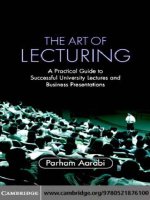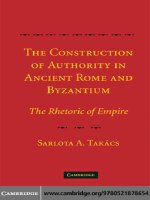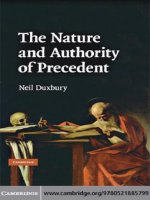052185377X cambridge university press the past as prologue the importance of history to the military profession may 2006
Bạn đang xem bản rút gọn của tài liệu. Xem và tải ngay bản đầy đủ của tài liệu tại đây (1.85 MB, 299 trang )
P1: JZZ
052185377Xpre
CB995/Murray
0 521 85377 X
February 22, 2006
This page intentionally left blank
i
1:30
P1: JZZ
052185377Xpre
CB995/Murray
0 521 85377 X
February 22, 2006
1:30
The past as prologue
In today’s military of rapid technological and strategic change, obtaining a
complete understanding of the present, let alone the past, is a formidable
challenge. Yet, the very high rate of change today makes study of the past
more important than ever before. The Past as Prologue explores the usefulness of the study of history for contemporary military strategists. It illustrates the great importance of military history while revealing the challenges
of applying the past to the present. Essays from authors of diverse backgrounds – British and American, civilian and military – come together to
present an overwhelming argument for the necessity of the study of the past
by today’s military leaders despite these challenges. The chapters of Part I
examine the relationship between history and the military profession. Those
in Part II explore specific historical cases that show the repetitiveness of
certain military problems.
Williamson Murray is Professor Emeritus of European Military History
at Ohio State University and a Senior Fellow at the Institute of Defense
Analysis. He is the author of a number of books, including The Changes in
the European Balance of Power, 1938–1939; The Path to Ruin; Luftwaffe;
German Military Effectiveness; The Air War in the Persian Gulf; Air War,
1914–1945; The Iraq War: A Military History, with Major General Robert
Scales, Jr.; and A War to Be Won: Fighting the Second World War, with Allan
R. Millet. He also coedited numerous collections, including Military Innovations in the Interwar Period (1996), with Allan R. Millet, and The Dynamics
of Military Revolution, 1300–2050 (2001), with MacGregor Knox.
Richard Hart Sinnreich is a former director of the U.S. Army’s School of
Advanced Military Studies. His writings include “The Changing Face of
Battlefield Reporting,” ARMY, November 1994; “To Stand & Fight,”
ARMY, July 1997; “In Search of Victory,” ARMY, February 1999; “Whither
the Legions,” Strategic Review, Summer 1999; “Conceptual Foundations of
a Transformed U.S. Army” with Huba Wass de Czege, The Institute for Land
Warfare, March 2002; “Red Team Insights from Army Wargaming,” DART,
September 2002; “Joint Warfighting in the 21st Century” with Williamson
Murray, IDA, 2002; and “A Strategy by Accident: U.S. Pacific Policy 1945–
1975,” National Institute of Defense Studies, March 2004. He writes a regular column for the Lawton Constitution and occasional columns for ARMY
and the Washington Post.
i
P1: JZZ
052185377Xpre
CB995/Murray
0 521 85377 X
ii
February 22, 2006
1:30
P1: JZZ
052185377Xpre
CB995/Murray
0 521 85377 X
February 22, 2006
The past as prologue
The importance of history
to the military profession
Edited by
WILLIAMSON MURRAY
Institute of Defense Analysis
RICHARD HART SINNREICH
Carrick Communications, Inc.
iii
1:30
cambridge university press
Cambridge, New York, Melbourne, Madrid, Cape Town, Singapore, São Paulo
Cambridge University Press
The Edinburgh Building, Cambridge cb2 2ru, UK
Published in the United States of America by Cambridge University Press, New York
www.cambridge.org
Information on this title: www.cambridge.org/9780521853774
© Cambridge University Press 2006
This publication is in copyright. Subject to statutory exception and to the provision of
relevant collective licensing agreements, no reproduction of any part may take place
without the written permission of Cambridge University Press.
First published in print format 2006
isbn-13
isbn-10
978-0-511-21992-4 eBook (EBL)
0-511-21992-x eBook (EBL)
isbn-13
isbn-10
978-0-521-85377-4 hardback
0-521-85377-x hardback
isbn-13
isbn-10
978-0-521-61963-9 paperback
0-521-61963-7 paperback
Cambridge University Press has no responsibility for the persistence or accuracy of urls
for external or third-party internet websites referred to in this publication, and does not
guarantee that any content on such websites is, or will remain, accurate or appropriate.
P1: JZZ
052185377Xpre
CB995/Murray
0 521 85377 X
February 22, 2006
1:30
To Andrew “Andy” Marshall and Theodore “Ted” Gold –
two servants of freedom who have made a difference.
v
P1: JZZ
052185377Xpre
CB995/Murray
0 521 85377 X
vi
February 22, 2006
1:30
P1: JZZ
052185377Xpre
CB995/Murray
0 521 85377 X
February 22, 2006
1:30
Contents
Contributors
page ix
1
Introduction
Williamson Murray and Richard Hart Sinnreich
2
Military history and the history of war
Michael Howard
1
12
Part I: The influence of history on the military profession
3
4
5
6
The relevance of history to the military profession: a British
view
John P. Kiszely
23
The relevance of history to the military profession:
an American Marine’s view
Paul K. Van Riper
34
Awkward partners: military history and American military
education
Richard Hart Sinnreich
55
Thoughts on military history and the profession of arms
Williamson Murray
78
Part II: The past as illuminator of the future
7
Thucydides as educator
Paul A. Rahe
95
vii
P1: JZZ
052185377Xpre
CB995/Murray
viii
0 521 85377 X
February 22, 2006
1:30
Contents
8
Clausewitz, history, and the future strategic world
Colin S. Gray
111
9
History and the nature of strategy
John Gooch
133
10
11
12
Military transformation in long periods of peace:
the Victorian Royal Navy
Andrew Gordon
150
Military history and the pathology of lessons learned:
the Russo-Japanese War, a case study
Jonathan B. A. Bailey
170
Obstacles to innovation and readiness: the British Army’s
experience, 1918–1939
J. Paul Harris
195
13
What history suggests about terrorism and its future
Christopher C. Harmon
14
History and future of civil–military relations: bridging
the gaps
Francis G. Hoffman
Index
217
247
267
P1: JZZ
052185377Xpre
CB995/Murray
0 521 85377 X
February 22, 2006
1:30
Contributors
Michael Howard
Professor Emeritus
Oxford University
Jonathan B.A. Bailey, M.B.E.,
A.D.C.
Major General
British Army (Retired)
John P. Kiszely, M.C.
Lieutenant General
British Army
John Gooch
Leeds University
Williamson Murray
Senior Fellow
Institute for Defense Analysis
Andrew Gordon
Joint Services Staff College
Colin S. Gray
University of Reading
Paul A. Rahe
University of Tulsa
Christopher C. Harmon
Marine Corps University
Richard Hart Sinnreich
Colonel
United States Army (Retired)
J. Paul Harris
Royal Military Academy
Paul K.Van Riper
Lieutenant General
United States Marine Corps
(Retired)
Francis G. Hoffman
Defense Consultant
ix
P1: JZZ
052185377Xpre
CB995/Murray
0 521 85377 X
x
February 22, 2006
1:30
P1: PIG
052185377Xc01
CB995/Murray
0 521 85377 X
February 22, 2006
1:33
1
Introduction
williamson murray and richard
hart sinnreich
If recent events are any guide, an unacknowledged conviction of too many of
those responsible for national security decisions, civilian and military, is that
history has little to offer today’s defense policy maker. Beset by accelerating
change, current senior leaders seem to have neither the time nor the inclination to look to the past for help. Events crowd one another too rapidly.
Technology matures too quickly. Crises succeed each other too abruptly.
Coping with a demanding present and confronting an ominous future, few
current civilian and military leaders seem willing to indulge in systematic
reflection about the past.
Too harsh a judgment? How else to explain political and military
assumptions preceding the 2003 invasion of Iraq that largely ignored the
history of the region, planning that discounted postconflict challenges
that had arisen even in the much less complicated overthrow of Manuel
Noriega’s corrupt Panamanian regime a mere thirteen years earlier, and
the slowness only thirty years after Vietnam to recognize and deal with
the insurgency that followed the collapse of Saddam Hussein’s regime?1
Overconfident in their ability to control the future, those responsible for
planning the invasion chose deliberately or by oversight to ignore history.
The future, unfortunately, turned out to look all too much like the past. As
Yogi Berra might have put it, Iraq was d´eja` vu all over again. That, too, is
a dismally familiar historical phenomenon.2
1
2
In fairness, some notables warned of these difficulties. Former national security adviser Brent
Scowcroft and retired regional combatant commanders Anthony Zinni, Wesley Clark, and
John Shalikashvili come to mind, as does then Army Chief of Staff Eric Shinseki, the only
active duty senior officer willing publicly to dispute the administration’s optimistic estimates.
For their trouble, they were ignored or vilified.
For the checkered performance of political and military leaders and their bureaucracies in
the making of strategy through the ages, see Williamson Murray, MacGregor Knox, and
Alvin Bernstein, The Making of Strategy, Rulers, States, and War (Cambridge, 1996).
1
P1: PIG
052185377Xc01
2
CB995/Murray
0 521 85377 X
February 22, 2006
1:33
Williamson Murray and Richard Hart Sinnreich
Indeed, political and military leaders’ tendency to discount history is neither novel nor peculiarly American. Throughout history, leaders and institutions have repeatedly manifested an almost willful ignorance of the past.3
One of the great myths of the twentieth century is that armies study only
their last war and thus do poorly in the next. That, for example, is the conventional explanation for the Franco-British allies’ military defeat of 1940.
According to the argument, French and British armed forces based their
force development throughout the interwar period on their experiences of
the First World War, whereas the Germans, unfettered by their defeat in
1918, searched for new methods to prevent a repetition of the deadlock that
had frozen the Western Front for four years.4
Nothing could be further from the truth. It was rather the Germans who
systematically and with brutal honesty reviewed the tactical failures of the
First World War,5 and then exploited that knowledge to create the military juggernaut that won such decisive battles in the early years of World
War II. The British blandly ignored the lessons of the First World War until
1932 and thereafter applied them indifferently, while the French deliberately
reinterpreted their own experiences in the last years of the war to satisfy
preconceived political and military preferences.6
Some 2,400 years ago, perhaps the greatest of all military historians,
Thucydides, declared that he had written his history of the Peloponnesian
War to inform “those who want to understand clearly the events which happened in the past, and which (human nature being what it is) will, at some
time or other and in much the same ways, be repeated in the future.”7
The trajectory of human history over the centuries since he wrote his masterpiece has more than confirmed his prognosis. Notwithstanding, successors
of the Hellenic soldiers and politicians about whom he wrote have repeatedly
chosen to believe that they are different and that the lessons of the past are
3
4
5
6
7
Many of history’s most successful soldiers were students of military history and not a few
wrote it themselves, including Thucydides, Julius Caesar, Ulysses Grant, and William Slim.
The reverse correlation between historical ignorance and military incompetence is likewise
too consistent to dismiss as accidental.
Defeat certainly can be a more effective engine of change than victory. Our own military’s
response to defeat in Vietnam is a case in point. But the records of the French and Italian
militaries in the twentieth century, among others, suggest that even defeat doesn’t guarantee sensible military transformation. For a detailed treatment, see Allan R. Millett and
Williamson Murray, Military Effectiveness, 3 vols. (London, 1988).
Though not, unfortunately, its strategic lessons. See, e.g., Holger H. Herwig, “Clio Deceived:
Patriotic Self-Censorship in Germany after the Great War,” International Security, Fall 1987.
Three useful treatments are James S. Corum, The Roots of Blitzkrieg, Hans von Seeckt and
German Military Reform (Lawrence, KS, 1992); Harold R. Winton, To Change an Army:
General Sir John Burnett-Stuart and British Armored Doctrine, 1927–1938 (Lawrence, KS,
1988); and Robert Doughty, The Seeds of Disaster: The Development of French Army
Doctrine, 1919–1939 (Hamden, CT, 1986).
Thucydides, History of the Peloponnesian War, trans. Rex Warner (London, 1954), p. 48.
P1: PIG
052185377Xc01
CB995/Murray
0 521 85377 X
Introduction
February 22, 2006
1:33
3
irrelevant to their unique circumstances.8 Why this is so remains one of the
mysteries of the human experience. Perhaps the most compelling explanation
is simply generational transition, the conviction of each new crop of leaders
assuming power that they are different from their predecessors and immune
from their errors. To paraphrase an old saying, what is new is not necessarily
interesting and what is interesting is not necessarily new. Yet, political and
military leaders seem driven to repeat the blunders of their predecessors. It is
the very repetitive quality of many of military history’s worst disasters that
can make reading it so depressing.
Thus, in 1940 and 1941, not a single senior German military leader
expressed the slightest qualm with Hitler’s plans for Barbarossa, the invasion
of the Soviet Union. Even Franz Halder, chief of the general staff and the
most analytical among its number, saw no reason to reflect on the unhappy
results of earlier such invasions, whether Charles XII’s or Napoleon’s. Only
as winter’s darkness descended on the battle lines in front of Leningrad,
Moscow, and Rostov in December 1941 did some senior German officers
belatedly began to consult Caulaincourt’s sobering memoirs of Napoleon’s
disastrous Russian campaign.9
All in all, considering that war is the most demanding and consequential
of human endeavors, it is astonishing how cursorily it tends to be studied by its practitioners. It is even more surprising given that most military
organizations spend the majority of their time at peace, which one might
suppose offered leisure if not incentive to study the past. Instead, modern
militaries are consumed with the recruitment and training of generations of
young men, the management of large military bureaucracies, and the routine
administrative burdens of command. In the day-to-day business of peacetime
soldiering, systematic study of the past all too easily becomes a luxury that
busy commanders and their subordinates cannot afford.
That is the more true because the serious study of history is difficult. It is
no simple matter to extract what is relevant and important from the wealth
of recorded military experience. Often, what appears relevant is trivial and
what appears significant is not easily transferable. Nor does history furnish
straightforward and comfortable answers to contemporary questions.
Beyond the desire of each generation to chart its own course and the
competition of peacetime routine, one should also note the natural human
distaste for upsetting evidence, especially when it challenges cherished
8
9
Herodotus’s earlier history of the great war between the Persians and the Greeks underlines
that little in the behavior of the latter had changed fifty years later when Thucydides wrote
his history of the Peloponnesian War.
For the best account of the 1941 German campaign against the Soviet Union, see Horst Boog,
¨
¨
¨
Jurgen Forster,
Joachim Hoffman, Ernst Klink, Rolf-Dieter Muller,
and Gerd R. Ueberschar,
Das Deutsche Reich und der Zweite Weltkrieg, vol. 4, Der Angriff auf die Sowjetunion
(Stuttgart, 1983).
P1: PIG
052185377Xc01
4
CB995/Murray
0 521 85377 X
February 22, 2006
1:33
Williamson Murray and Richard Hart Sinnreich
convictions. Not all leaders find intellectual debate congenial, and even fewer
relish challenges to their own ideas and assumptions.10 Immersion in history
inevitably invites both. History raises more questions than it answers. It suggests unpleasant possibilities. It demolishes preferred theories. It often forces
leaders to recognize unpalatable truths. Yet, it also suggests possible paths to
the future, no matter how uncomfortable. Perhaps most important, it compels them to think dispassionately about potential opponents – their nature,
worldview, aims, and options.
It is this understanding of the “other” – the adversary – that has repeatedly
proved most difficult for civilian and military leaders to acquire, an understanding that history suggests is crucial to success in war. Thus, the failure of
European rulers in the early nineteenth century to recognize the magnitude
of the sociological changes wrought by the French Revolution and of their
commanders to understand the military implications of Napoleon’s expropriation of it goes far to explain the terrible series of defeats suffered by France’s
enemies between 1792 and 1811. As Carl von Clausewitz commented:
Not until statesmen had at last perceived the nature of the forces that had
emerged in France, and had grasped that new conditions now obtained in
Europe, could they foresee the broad effect all this would have on war. . . . In
short, we can say that twenty years of Revolutionary triumph were mainly due
to the mistaken policies of France’s enemies.11
Still another of the obstacles to acquiring and using historical knowledge
littering the policy landscape is the bureaucratic nature of modern governments. Bureaucracies often conserve the past but rarely examine it critically.
Such examination would challenge the routines that smooth the bureaucratic
process. We already noted the impact of peacetime routine on the willingness
and ability of military organizations to study history seriously. That routine
is even more pronounced in the civilian bureaucracies that drive modern
governments.12 It is easy for bureaucrats to become imprisoned by it. The
past then becomes a nuisance, and its qualifiers and warnings merely a threat
to their projects. For too many, potential adversaries are merely a convenient
justification for funding, not real people we might actually have to fight one
day. Their history, when cited at all, serves only as a source of aphorisms,
10
11
12
Considerable evidence confirms that the rejection, if not outright suppression, of competing
views has preceded more than one of history’s most egregious military blunders. For example, see Williamson Murray, The Change in the European Balance of Power, 1938–1939:
The Path to Ruin (Princeton, NJ, 1984).
Carl von Clausewitz, On War, ed. & trans. Michael Howard and Peter Paret (Princeton,
NJ, 1986), p. 609.
One might recall that the report of the 9/11 Commission commented that a principal reason
for the failure to anticipate the September 11 catastrophe was a uniform lack of imagination
in the intelligence bureaucracy, this despite ample prior evidence of al Qaeda’s general
intentions, if not their specific plans.
P1: PIG
052185377Xc01
CB995/Murray
0 521 85377 X
February 22, 2006
1:33
Introduction
5
not a means of deciphering the complex interrelationships that are likely to
affect their future behavior.13
Finally, of course, bureaucracies, military and otherwise, are hostage to
the political sensitivities and prejudices of those they serve. History has a
bad habit of upsetting both. During the last few decades, American defense
policy making especially has been afflicted by politically appealing but historically unsupported assumptions about the nature of war and the sacrifices,
material and moral, required to prosecute it. As they percolate through the
organizational apparatus, such assumptions gain acceptance despite lack of
evidence. The result, only too visible in today’s defense establishment, is an
endless effort to find easily marketed and preferably inexpensive solutions
to the most complex and difficult of national enterprises.
In such a climate, history at best is an inconvenience and at worst an
outright embarrassment. A contemporary historian captured the problem
all too succinctly in relation to the challenge of designing strategy in the
twenty-first century:
In this bewildering world, the search for predictive theories to guide strategy
has been no more successful than the search for such theories in other areas
of human existence. Patterns do emerge from the past, and their study permits
educated guesses about the range of potential outcomes. But the future is not
an object of knowledge; no increase in processing power will make the owl of
history a daytime bird. Similar causes do not always produce similar effects, and
causes interact in ways unforeseeable even by the historical sophisticated. Worse
still, individuals – with their ambitions, vanities, and quirks – make strategy.
Machiavelli’s Prince is sometimes a better guide than Clausewitz to the personal
and institutional vendettas that intertwine unpredictably around the simplest
strategic decisions.14
One of the great ironies in today’s America is that its civilian policy makers
will for the most part be even more ignorant of the past than the military officers who serve them. The latter at least are compelled by the professional military education system to confront history at various points in their careers,
however infrequently. Their political masters are under no such compulsion.
Perhaps this is inevitable. Political leaders invariably reflect the prejudices
and attitudes of the citizens they defend, and Americans are by birthright
prone to dismiss history as a brake on their ambitions. Even in the military,
13
14
A classic example was the inability of advocates of German appeasement in the late 1930s
to recognize how extraordinarily different the norms and aims of Nazi Germany were from
their own. For the need to understand other cultures in planning and conducting war in the
twenty-first century, see Major General (Retired) Robert H. Scales, Jr., “Culture-Centric
Warfare,” Naval Institute Proceedings, October 2004.
Macgregor Knox, “Continuity and Revolution in Strategy,” in Williamson Murray,
MacGregor Knox, and Alvin Bernstein, eds. The Making of Strategy, Rulers, States, and
War (Cambridge, 1996), p. 645.
P1: PIG
052185377Xc01
6
CB995/Murray
0 521 85377 X
February 22, 2006
1:33
Williamson Murray and Richard Hart Sinnreich
there will always be some who from loyalty or discretion accept without
challenge the cavalier assumptions of political leaders unwilling to consult
the past and unable to hear its echoes.
At present, moreover, even in the military, what too often takes the place
of serious historical analysis is an intense but historically undisciplined theorizing. Indeed, the surfeit of “transformational” concepts currently besieging
senior civilian and military leaders is incredible. Some seek to demolish the
institutional traditions believed to prevent the separate military services from
harmonizing their activities and resources effectively; others seek to expand
the scope of civilian influence on historically military concerns; whereas still
others seek the technological means of eliminating the inherent ambiguity
and friction of war.15
Forward thinking is necessary. But what characterizes too much of it today
is an almost complete disconnection from the past, surprising as that may
seem in a military with an almost uniformly successful tradition. Part of
the explanation lies in the dominance for almost a half-century in American
policy-making circles, military as well as civilian, of political science and
management theories exhibiting an almost theological aversion to history
as a source of insight and evidence. But the broader explanation is simply
that military organizations and their leaders are too consumed by immediate
pressures to examine the past in a serious and critical way. New concepts are
both less onerous to justify and easier to market to a defense industry hungry
for new business and to politicians seeking less materially and politically
expensive solutions to war’s complexities.
Many have warned of the risks associated with such ahistorical theorizing.
Attacking military theoreticians of his own time, Clausewitz was especially
blunt. His comments on the writings of some of his colleagues in the nineteenth century might just as cogently be applied to many of today’s conceptual efforts:
It is only analytically that these attempts at theory can be called advances in
the realm of truth; synthetically, in the rules and regulations they offer, they are
absolutely useless. They aim at fixed value; but in war everything is uncertain,
and calculations have to be made with variable quantities. They direct the
inquiry exclusively toward physical quantities, whereas all military action is
intertwined with psychological forces and effects.16
15
16
Examples unfortunately are legion, but for one representative concept, the reader might
examine Joint Vision 2010, an extraordinary collection of historically unsupported dicta
produced in the early 1990s, which set the tone for many of the concepts that followed
over the next decade and a half. The contrast with earlier military concepts could not be
more apparent. For notable examples, consult the 1982 and 1986 editions of the Army’s
Field Manual 100-5, “Operations,” and the Marine Corps’ 1989 FMFM 1 “Warfighting”
and its 1997 successor MCDP 1, each of which relied heavily on historical analysis.
Clausewitz, p. 136.
P1: PIG
052185377Xc01
CB995/Murray
0 521 85377 X
February 22, 2006
1:33
Introduction
7
Conceptualization and experimentation certainly have their uses. But only
history records the reactions of real people to real events in the context of the
real pressures that policy making and war making inevitably impose. Again,
Clausewitz:
[Theory] is an analytic investigation leading to close acquaintance with the
subject; applied to experience – in our case to military history – it leads to thorough familiarity with it. The closer it comes to that goal, the more it proceeds
from the objective form of a science to the subjective form of a skill, the more
effective it will prove in areas where the nature of the case admits no arbiter but
talent. It will, in fact, become an active ingredient of talent.17
The central purpose of this book is to illustrate the qualities that make
the study of history so important to military leaders, and at the same time,
consider what makes it so difficult and challenging for those who choose to
engage in it. Not long after the seizure of Baghdad in April 2003, a Marine
Corps instructor at the National War College wrote to his former boss, then
Major General James Mattis, commanding the 1st Marine Division during
the invasion, asking how Mattis would reply to officers who discount history
as having little relevance or utility to their military careers. Mattis wrote
back:
Ultimately a real understanding of history means that we face nothing new
under the sun. For all the “Fourth Generation of War” intellectuals running
around today saying that the nature of war has fundamentally changed, the
tactics are wholly new, etc., I must respectfully say: “Not really.” Alex the
Great would not be in the least perplexed by the enemy that we face right now
in Iraq, and our leaders going into this fight do their troops a disservice by not
studying (studying, vice just reading) the men who have gone before us. We have
been fighting on this planet for 5000 years and we should take advantage of
their experience. “Winging it” and filling body bags as we sort out what works
reminds us of the moral dictates and the cost of competence in our profession.18
No one who knows James Mattis well would ever mistake him for an
ivory tower intellectual. On the contrary, he is the epitome of a combat
commander, a leader who consistently leads from the front. But like so many
successful military commanders before him, from Alex the Great to George
Patton, Mattis also is a committed student of war. For Mattis, as for his
celebrated predecessors, to be a student of war is first to be a student of
military history.
This book reflects the same conviction. The authors of its various essays
believe the study of military history plays an essential role in the educational development of future military and civilian leaders. In addressing what
17
18
Ibid, p. 141.
Unpublished e-mail, quoted by permission of the author.
P1: PIG
052185377Xc01
8
CB995/Murray
0 521 85377 X
February 22, 2006
1:33
Williamson Murray and Richard Hart Sinnreich
America’s war colleges should teach their students, Admiral Stansfield
Turner, former president of the Naval War College and the author of its
widely praised educational reforms of the early 1970s, noted:
War colleges are places to educate the senior officer corps in the larger military
and strategic issues that confront America in the late twentieth century. They
should educate these officers by a demanding intellectual curriculum to think in
wider terms than their busy operational careers have thus far demanded. Above
all the war colleges should broaden the intellectual and military horizons of the
officers who attend, so that they have a conception of the larger strategic and
operational issues that confront our military and our nation.19
Without attention to history, there can be no such professional broadening
of officers beyond the immediate scope of their duties. Apart from the conduct of war itself, the only comprehensive evidence of the demands it places
on those who fight it and their leaders is the evidence of history. Written
from a number of different perspectives, the essays in this volume illuminate
the extraordinary richness of that evidence, as well as the extent to which its
study can inform military innovation in peacetime and adaptation in war.
Some focus on war’s enduring features and challenges, whereas others suggest the insights furnished by particular historical cases. Still others examine
the sometimes troublesome relationship between those who make military
history and those who record it.
All are products of an extraordinarily pleasant and productive AngloAmerican scholarly collaboration during the summer and fall of 2003. Each
was originally written and presented at “Past Futures,” a conference on
military history at the Royal Military College, Sandhurst, sponsored by
the British Army’s Directorate of Ground Development and Doctrine, the
British counterpart of the U.S. Army’s Training and Doctrine Command.
Subsequently, all but Sir Michael Howard’s were presented at a follow-on
conference at Marine Corps University, Quantico, sponsored by the Marine
Corps University Foundation. The authors reflect a broad diversity of backgrounds and interests – British and American, civilian and military, scholars
and practitioners. Whatever their professional credentials and orientation,
all share the conviction that studying military history is a crucial prerequisite
to understanding the nature and future of war.
It is certainly not the only prerequisite. Other ingredients, from familiarity
with emerging technologies to awareness of cultural differences to actual
battlefield experience, contribute to that understanding. But the authors in
this volume uniformly believe these other ingredients are ultimately sterile
unless grounded in a careful and thorough examination of the past.
19
Quoted in Williamson Murray, “Grading the War Colleges,” The National Interest, Winter
1986/1987, p. 13.
P1: PIG
052185377Xc01
CB995/Murray
0 521 85377 X
Introduction
February 22, 2006
1:33
9
Their essays reflect that view. Sir Michael Howard’s generous permission
to use his keynote address to the first Past Futures conference as the introductory essay is a special gift. Perhaps the most distinguished military historian
writing today, Sir Michael has been a mentor and model for every other contributor in the book. His essay eloquently reminds us that, whatever its many
other contributions may be, military history and war studies are in the final
analysis about war, and that, although much modern historiography rightly
and usefully examines war in its broadest context, the study of war finally
is about fighting. Classic military history – the study of military operations
and campaigns – thus remains a sine qua non of the study of war.
We have divided the remaining essays into two groups. Those in Part I
examine various aspects of the relationship between history and the military
profession. To a considerable extent, they seek to elucidate how one might
think about the possible and potential uses of history within the framework
of professional military education and the careers of officers. The essays
in Part II examine specific historical cases that illuminate recurring military problems. For convenience, we have grouped the essays in this section
chronologically.
Lieutenant General John Kiszely, British Army, begins the first section by
reminding us that using military history superficially can be more dangerous
than ignoring it altogether. In particular, he urges that its study be imbedded
in a broader and deeper commitment to professional self-education, a commitment that requires deliberate encouragement by military institutions. His
chapter is followed by that of Lieutenant General Paul Van Riper, USMC
retired, whose autobiographical essay describes how a lifelong progressive
engagement with military history, largely self-driven and managed, helped
shape a distinguished military career in peace and war.
In the third essay, Colonel Richard Sinnreich, U.S. Army retired, traces the
evolution of historical study in America’s formal military education, a relationship marked by episodic advances and retreats driven by both scholarly
and military fashion. The final essay in this section, by Williamson Murray,
professor of military history emeritus at The Ohio State University, underlines that, too often, soldiers’ engagement with military history is distorted by
an unhappy congruence between historians’ need to simplify a phenomenon
suffused with ambiguity and uncertainty and soldiers’ yearning for didactic
guidance.
Indeed, Murray argues, for history to be of any use, its very complexities
demand skeptical inquiry rather than reliance on a smattering of inevitably
oversimplified historical anecdotes. As General Mattis suggests, therefore,
military history, not to mention history in general, is of little value unless it
is studied, not merely read.
The essays in Part II address more directly recurring military phenomena and the ability of history to illuminate them. The first two examine the
P1: PIG
052185377Xc01
10
CB995/Murray
0 521 85377 X
February 22, 2006
1:33
Williamson Murray and Richard Hart Sinnreich
writings of two seminal thinkers about war and the human condition. Paul
Rahe, professor of history at the University of Tulsa, examines Thucydides.
His essay demonstrates that studying war in its wider social context is far
from a modern preoccupation, in the process reaffirming the contemporary
relevance of the first, and in many ways still most important, military historian to the study of war and its impact on civil society. Professor Colin Gray
of the University of Reading offers a spirited defense of Clausewitz. His essay
is a refreshing and much-needed antidote to those British and American academics who over the past several decades have spilled much ink arguing the
irrelevance of the Prussian theorist to the conditions of the modern world
(in a few cases, apparently, without having bothered to read him).20
The third essay, by John Gooch, Professor of History at Leeds University, examines what history has to say about strategy. Both Thucydides and
Clausewitz would approve of Professor Gooch’s careful distinction between
history as a source of not always reliable maxims and as a means of diagnosing and understanding recurring patterns of strategic behavior, a distinction
too rarely acknowledged by strategic practitioners.
The next three essays in Part II apply the lens of historical analysis to
the very contemporary problem of how military institutions cope – or fail
to cope – with major technological changes. Andrew Gordon, lecturer at
Britain’s Joint Services Staff College, describes the impact on the Royal Navy
of a prolonged period without major maritime warfare, during which the
technology of war at sea underwent rapid and massive changes, while it
managed to forget almost entirely the principles on which its great victories in the early nineteenth century had rested. Major General Jonathan
Bailey, chief of the British Army’s Directorate of Ground Development and
Doctrine, examines the failure of Western armies to learn from the experiences of the 1904–1905 Russo-Japanese War, in every way the harbinger
of the nightmarish Great War that followed barely a decade later and came
close to destroying Europe. Paul Harris, lecturer of War Studies at the Royal
Military College, offers a thoughtful rebuttal of the conventional view that
early British defeats in the Second World War reflected professional military
myopia, instead locating many of the prewar British Army’s difficulties in
broader political, economic, and intellectual obstacles that began by hindering innovation before the war and ended by retarding adaptation to its
actual conditions.
The last two essays examine military challenges that transcend particular historical eras, having arisen repeatedly over the course of the centuries
20
In Britain, there is a long tradition of criticizing Clausewitz, beginning with B. H. Liddell
Hart. Americans’ rejection of Clausewitz’s work is more recent, and reflects both emotional
distaste for Clausewitz’s merciless realism and insistence on the power of modern information systems to dissipate the fog and friction of war. For the latter view, see Admiral Bill
Owens with Ed Offley, Lifting the Fog of War (New York, 2000).
P1: PIG
052185377Xc01
CB995/Murray
0 521 85377 X
Introduction
February 22, 2006
1:33
11
without enduring solution. Chris Harmon, professor at Marine Corps
University, dissects the use of terrorism as an alternative to classic interstate warfare. His essay at once clarifies the terrorist threat confronting the
democracies today and underlines some of the inherent vulnerabilities to
which such unconventional enemies are prey. Frank Hoffman, a defense
consultant in Washington, DC, analyzes American civil–military relations in
their historical context. In the process, he identifies some of the perceptual
differences that make that vital relationship so persistently problematic.
In the end, like the phenomenon it studies, military historiography is a
human enterprise, with human attributes and flaws. Military and civilian
institutions can and should contribute to its development, improvement,
and exploitation, but all three finally depend on the personal intellectual
commitment of scholars and soldiers to their vocations and successors. Just
as the younger essayists in this volume are all, in one way or another, Sir
Michael Howard’s intellectual heirs, and before him of military historians
reaching back to Thucydides, so too, serving military commanders like Jim
Mattis are Paul Van Riper’s intellectual heirs and before him of historically
literate military practitioners reaching back to Clausewitz and earlier.
Young soldiers and marines, as well as scholars, take their cues from the
leaders of their profession. Today, in a period of accelerating strategic and
technological change, it is all the more essential that soldiers confront the
future with a firm understanding of war’s continuities, and that scholars
furnish them the best historical analysis of which they are capable in which
to ground that understanding. The moral dictates and cost of competence
cited by General Mattis thus apply equally to both professions. It is in explicit
recognition of that joint responsibility that we offer this volume.
P1: JPJ
052185377Xc02
CB995/Murray
0 521 85377 X
February 22, 2006
1:36
2
Military history and the history of war
michael howard
When the first university chair in our subject was established at Oxford in the
first decade of the twentieth century, its field was defined simply as “Military
History,” and it took two world wars to broaden this to the “History of War.”
I have no firm evidence for this, but I suspect that the change was made to
make it clear that the incumbent was expected to cover naval and air matters
as well.
The same enlargement occurred in the scope of the only other similar chair
in this country, which was established after the First World War at King’s
College London for Lloyd George’s nemesis, General Sir Frederick Maurice,
and about this I can speak with greater authority. The people responsible
for reviving it after the Second World War were not military men; they were
academics in the University of London who had been involved in the civilian conduct of the war – economists like Lionel Robbins, social historians like Sir Keith Hancock, diplomatic specialists like Sir Charles Webster.
They knew from personal experience that the conduct of war was too serious a business to be left to the generals and believed in consequence that
the study of war was too important to be left to military historians. The
scope that they had in mind was so wide that they were not sure how to
define it.
I recall a meeting of the great and the good in the early 1950s, where
the title of the chair was being debated. Because its subject matter was
not confined to history, they adopted that usefully vague term “studies”;
one that was then in its infancy and today provides cover for innumerable soggy nonsubjects. But how were these “studies” to be defined? If they
were not “military,” what were they? “Defense Studies” was deemed too
mealy mouthed. “Strategic Studies” was too narrow. “Conflict Studies” was
too broad. One learned scholar suggested, in desperation, “Polemelogical
Studies.” At last Sir Charles Webster, a blunt and massive Yorkshireman, hit
12
P1: JPJ
052185377Xc02
CB995/Murray
0 521 85377 X
February 22, 2006
Military history and the history of war
1:36
13
the table with a fist the size of a large ham and demanded: “It’s about war
isn’t it? So what’s wrong with War Studies?”
So, War Studies it became and has remained ever since. I was put in to
hold the fort until they could find someone more eminent to occupy the
chair (which I am glad to say they never did), and they genially made it clear
to me that there were no limits to the claims I might stake out. I myself
might teach the history of war, which was all I knew about, but I was to
recruit as widely as possible among other disciplines: international relations,
naturally; strategic studies, a subject whose birth had just been precipitated
by the invention of nuclear weapons; economics, and the social sciences in
general; law, both international and constitutional; anthropology; theology –
indeed anything that I could think of and whose practitioners I could interest. If black studies, gender studies, gay studies, or media studies had then
existed, I would certainly have colonized them as well. In short, I laid the
foundation for that vast empire over which Professor Sir Lawrence Freedman
now presides on both banks of the Thames.
I am myself always a little uneasy when described as a “military historian.”
Until very recently, the great majority of professional historians found it
hard to think of the term in anything but a rather pejorative sense: “military
history is to history,” as I think someone once said, “what military music is
to music.” To dismiss it in this way is of course grossly unfair, but for doing
so I think there have been two good reasons. “Military history” was equated
with “operational history,” and most of it – at least, before the twentieth
century – was written, and studied, to enable soldiers to be better at their
jobs. This was and remains a quite legitimate function. Past wars provide the
only database from which the military learn how to conduct their profession:
how to do it and even more important, how not to do it.
Good, accurate military history serves a necessary purpose so long as
we have a military profession at all. Clausewitz warned of the misuse of
military history, of expecting it to provide “school solutions” rather than
to educate the minds of the military commander to expect the unexpected,
but his warnings have all too often been ignored. One does not, or anyhow
should not, study the past in order to discover the “school solutions” – that
is the first “lesson” that professional historians have to drum into the heads
of their pupils. Nevertheless, however intelligently it may be studied, military
history has preserved for many of its readers and writers a distinct didactic
purpose to which few other branches of historical studies would lay claim
and one which they regard with understandable suspicion.
The second characteristic of much – indeed I would say most – military
history is its parochialism. It has all too often been written to create and
embellish a national myth, and to promote deeds of derring–do among the
young. I would like to be able to say that this is a characteristic that military
historians have now outgrown, but we have only to step into any bookshop









